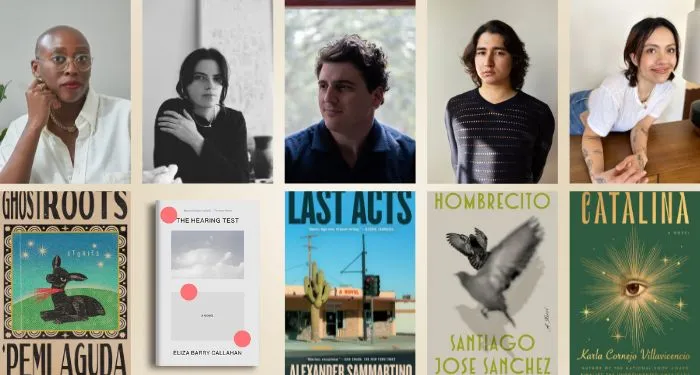Steph Auteri is a journalist who has written for the Atlantic, Pacific Standard, Rewire News Group, and elsewhere. She's also overshared about her personal life in Creative Nonfiction, under the gum tree, Poets & Writers, and other publications. Her work has twice been listed as Notable by Best American. She's also the author of A Dirty Word, the Essays Editor for Hippocampus Magazine, the Editor in Chief of Feminist Book Club, and the founder of Guerrilla Sex Ed. When not working, Steph enjoys embroidery, singing, yoga, and cat snuggles. You can learn more at stephauteri.com, and you can follow her on Insta, Threads, and Bluesky at @stephauteri.
I tend to hesitate before picking up books that cycle through multiple points of view. If they’re not well done, they can feel unwieldy. If I’m bored by one of the POVs, I get bored and impatient every time I cycle back to one of their chapters. Sometimes, all that back and forth just feels jarring. I don’t want narrative whiplash. I just want the story.

But Heartwood by Amity Gaige—a literary thriller that came out this month—felt different.
In Gaige’s novel, a woman hiking the Appalachian trail goes missing. It’s unclear whether there’s been foul play, or whether it’s simply hiker error. And when the book opens with that lost hiker’s POV, this remains unclear.
Rather, 42-year-old Valerie Gillis communicates to readers via letters she’s writing to her mother…letters she’s unsure will ever reach their intended recipient.
Despite the ambiguity, we learn a lot about our missing hiker through these missives, and about what might motivate a person to go missing from their everyday life.
The book continues on, cycling through interviews with Valerie’s trail bestie, the POV of the game warden tasked with locating Valerie, and a woman in a distant retirement community who becomes personally invested in Valerie’s case. Each of these characters is filled with depth and complexity, and none of their narratives feels like a distraction from the main story arc. Instead, as their stories slowly converge, the book delves into the experience of feeling lost, and how we might be found, both literally and metaphorically.
I feel as if this has been the year of adventure thrillers (I’m looking at you Liz Moore’s The God of the Woods). Or maybe the year of mysteries that don’t necessarily read like mysteries. Fellow Book Riot writer Jamie Canaves touched upon this in her post on books like The God of the Woods, and Erica Ezeifedi even declared Moore’s book the Book of the Summer back in July 2024. Kendra Winchester also featured Moore’s book in a previous edition of Read This Book. Perhaps Heartwood is the newest iteration of that.
Of course, literary thrillers are nothing new. (My heart belongs to authors like Tana French, Colson Whitehead, Erin E. Adams, Quan Barry, and Megan Abbott.)
But I wonder if these latest titles mark a new wave of authors who excel at teasing a good mystery while also delving into deeper truths.
The following comes to you from the Editorial Desk.
This week, we’re highlighting a post that had our Managing Editor Vanessa Diaz feeling a type of way. Now, even five years after it was published, Vanessa is still salty about American Dirt. Read on for an excerpt and become an All Access member to unlock the full post.
Picture it: The United States, January 2020. A book with a pretty blue and white cover is making the rounds on the bookish internet. The blue ink forms a beautiful hummingbird motif against a creamy background, a bird associated with the sun god Huitzilopochtli in Aztec mythology. Black barbed wire, at once delicate and menacing, cuts the pattern into a grid resembling an arrangement of Talavera tiles. The package is eye-catching, ostensibly Mexican in feel, and evocative of borders and the migrant experience.
The book tells the story of a bookstore owner in Acapulco, Mexico, who is forced to flee her home when a drug cartel murders everyone in her family except for her young son at a quinceañera. She and the boy are forced to become migrants and embark on a treacherous journey north to the U.S. border, evading the cartel and befriending fellow migrants along the way. The book is being lauded not just as the “it” book of the season but as the immigration story. It gets the Oprah treatment and is praised by everyone from Salma Hayek to the great Sandra Cisneros, who called it “the great novel of Las Américas.”
It’s been over five years, and this book is still the bane of my existence.
Sign up to become an All Access member for only $6/month and then click here to read the full, unlocked article. Level up your reading life with All Access membership and explore a full library of exclusive bonus content, including must-reads, deep dives, and reading challenge recommendation.



















 English (US) ·
English (US) ·